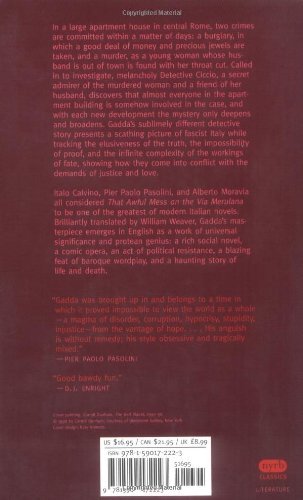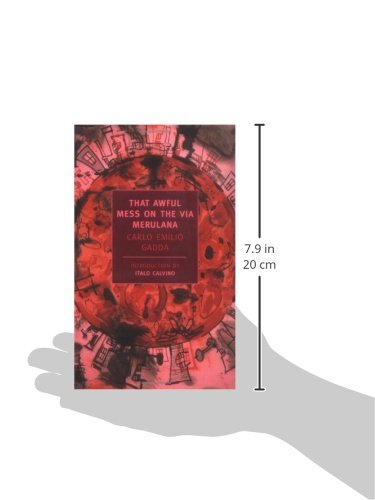



That Awful Mess on the Via Merulana (New York Review Books Classics)
R**A
Tortuous, witty novel with inventive language
The narration is uncommon, messy (but not in an awful way), Gadda is telling a part of the story and suddenly the book seems to take a recursive dive into a character's or a place's description. Just as suddenly you find yourself out of that segue again.One moment you're amidst nobility and la borghesia and another you're surrounded by characters of the Roman low-life: thieves and more. All of them regardlessly are very keen on eluding the investigation and lying to our Ingravallo; all have something to hide.I believe that the transator did a monumental job in the English adaptation, for Il Pasticciaccio is close to being untranslatable (almost as much as the masterpiece Grande Sertão: Veredas by Guimarães Rosa). The author's mastery of the Italian language and the many dialects of that country greatly enriches the novel and make the characters more interesting.This is a difficult if not tortuous novel, that rewards the reader with the notion that you have met some of the shady characters of the Lazio.
T**T
Verbal Sprawl
First off, DO NOT READ THE $#%@ing INTRODUCTIONS. This is not an easy book to get through - but it's much harder to get through when the introductions reveal the ending and deprieve you of your (much needed) motiviation to plow through this text. Am I the only one who thinks we need more Afterwords? The main reason I bought the book was for Italo Calvino's introduction - and even in the introduction the book sounded boring.Here's the problem: You have a typical literary crime novel drowning in what appears to be an encyclopedia. You have sprawling descriptions of cities, metal processes, historical respectives, a minor treatise of pastries, etc. And occasionally, there plot plods drunkenly on. It is so bad that the real investigation does not get underway until will into the second half of the book. Oddly, despite the piles of description in the text, you get no real sense for anyone in the book.It reads like the Italian answer to Joyce's Ulysses only something of a story.The sentences in this book are verbal labyrinths- by the time you finish a sentence, you forgot were it began and how it related to the sentence in front of it or how it related to the novel.Here's an example of the actual text (and yes, this is one sentence):"A majolica pan, as if from a clinic of the first category, was set on the brick floor, and not even near the wall: and neither did it lack some undeciphered content, on the consistence, coloration, odor, viscosity, and specific weight of which both the lynx eyes and bloodhound scent of Ingravallo felt that it wasn't necessary to investigate and analyze: the nose, of course, could not exempt itself from its natural functioning, that is from that activity, or to be more accurate, the papillary passivity which is proper to it, and which does not admit, helas, and interlude or inhibition or absence of any kind from its duty."All that is too say: There's poo in the bucket and it smells quite bad.If you're looking to read 300 pages of jammed meandering narrative like that above, this is the book. The jammed style isn't accidental, you get the feeling it is supposed to be humorous and makes typical references to the joys of a young buxom girls. The joke, however, becomes tedious within two minutes. And then you start wondering: Is this a joke? Was he getting paid by the word? Did the author enjoy peculiar snacks, such as mercury thermometers?
A**Y
This is an excellent book by Emilio Gadda
This is an excellent book by Emilio Gadda. Travel to Rome and go to Via Merulana Street to see for yourself- Richard Burton made a movie of this W.W. II event, in which the Nazis slaughter a group of the Italian resistance fighters, the slaughter taking place near the Jewish Resistance Museum, near the Lateran Church, in Rome. Arrived quickly enough and in great condition. Ordered a second copy and gave it to Italian friends. Thank you.
J**E
Wonderful, unexpected book
Wonderful, unexpected book. Gadda's prose is unlike anyone else's. Certainly a difficult read, but worth the effort. Just don't expect a typical story, written in a typical way.
J**U
Ready to read
A nice book
G**O
If You Can't Get Up to Speed ...
... stay off the Autostrada! If you can't dodge Vespas and stare down pedestrians, don't drive in Roma! Likewise, if you don't like prose that zigzags capriciously, that scorns all stop-sign punctuation, that slams to a stop in mid-passage to gawk at an allusion or a fascinating irrelevancy, stay very far away from Carlo Gadda's work and in particular his best-known crime novel "That Awful Mess on the Via Merulana." It's nobody's idea of easy reading.I tried to read "Quer Pasticciaccio Brutto de la Via Merulana" years ago, when I lived in Roma and walked along the Via Merulana once or twice a week. I failed miserably. I wasn't alone in failure, however; fully 99% of native Italian speakers would have just as much trouble with it. Gadda's prose is a jangle of school Italian, Roman dialect, and words that can't be found in any normal dictionary, including quite a few that Gadda coined. Gadda's puns in Italian are outrageous -- outrageously funny, that is, if you catch them. Gadda's allusions to history, science, theology, and engineering are frighteningly broad and arcane, and some of them are simply Gaddaesque humbug. You truly do need to have a sense of place, of the physical and social topography of Roma, to wind your way through the narrative. Even more important, you need a reasonable knowledge of Italian history and a thorough knowledge of the Mussolini era, first to make sense of Gadda's anti-Duce tirades and second to give a damn about them. So: CAVEAT LECTOR!I confess that I was skeptical when another amazoony reviewer alerted me to this translation by William Weaver. Are books like Joyce's Ulysses and Nabokov's Pale Fire really translatable? The "Pasticciaccio" belongs in that select company. But Weaver has done an astounding job of replicating Gadda's style -- all but the Romanaccio slang -- and capturing his bizarre humor. This is, in English, a very funny, quirky, bawdy, blasphemous book!The novel is purportedly a murder mystery, and in fact it has some of the ambience of classic crime fiction, including a dour "flatfoot" cop who would be at home in a Raymond Chandler or Arnoldur Indridasson novel. If you demand a tight-tushy conclusion, I warn you, you won't be pleased at how much of the "mess" on Via Merulana remains "awful" to the end. The crime is only a pretext for superbly eccentric ruminations and historical retributions against Italian fascism.Now the question: would you let the frenetic confusion of traffic in Roma prevent you from visiting the world's most interesting city? The analogy is here for you to figure out.
P**E
Defeated!
Unfortunately I couldn't finish this. Perhaps it really needs to be read in Italian. I could still see, however, that it contains strands of extraordinary brilliance. (eg.'There are murky moments in the slow drip-drip of the hours: the hours of puberty. Evil crops up unexpectedly in sudden,horrible shards from beneath the tegument, from beneath the skin of gossip...from beneath the covering of decent appearances, like a stone it breaks the ground, and you can't even see it: like the dark hardness of the mountain, in a green field.') It's another one of those books that are set in an apartment block and juxtapose the lives of the residents. Like Ballard's High Rise, for example.
P**B
Just get lost in the language
This book is quite amazing. I think if you read it as a murder mystery then it might irritate, because they depend so much on the plot moving forward in a clear way, but just lose yourself in the language and it is really quite special. I can't remember when I last had to make notes to look up references to events and people of which I was unaware, let alone the meaning of words I had never before met, but it was all worth while.
I**.
A fine new paperback version of an old classic
Wanted to deepen my appreciation of Italian detective novels with this early classic. It's a little work to read but very well worth it!
A**H
If only it were finished.. Disjointed: somewhat ...
If only it were finished..Disjointed: somewhat. Confusing: often. Worth it: certainly. So much more than a procedural, an entertaining if slightly maddening romp through fascist Italy's society and policing structures.
S**S
The sesquipedalian arrivederci
Not too many unfinished detective novels (Edwin Drood, maybe?) are celebrated for their literary prowess. Gadda wrote this Rome-set tale (about a woman who endures first a jewel theft and then a murder) during and after WW2 and - since he lived to 1973 - could presumably have finished it had he so chosen. But the conventional resolution of the crimes is not the point here; Gadda, like his curly-haired detective, doesn't believe that 'catastrophes' are caused by 'a single motive' but by a multitude of converging causes. They are "a cyclonic point of depression in the consciousness of the world". For example, the re-discovery of the jewels in 'That Awful Mess...' is as much instigated as foretokened by a dream which is recalled by a carabinieri as he rides a moped (in pre-war Italy the police even catch buses to attend a crime scene!) on the way to interview a suspect. This dream sequence is one of several bravura passages that pepper the book - packed with arcane words, neologisms and references to common and obscure (typically Roman) myths. Conscientious readers are likely to interrupt every other page of 'That Awful Mess...' by poring through dictionaries and concluding more-often-than-not that the word under investigation is another of Gadda's inventions. William Fever (who also translated Umberto Eco's 'The Name of the Rose') is to be congratulated on wrestling 'That Awful Mess...' into any kind of English. In only one instance does Fever give up the struggle and point out that an extended descriptive passage featuring 'light' and 'toes' is based on an obdurate Italian pun (respectively, 'la luce' and 'l'alluce'); otherwise he battles heroically to re-accommodate the mixed Italian dialects, slang and coprolalia that Gadda splashes around. The upshot is like putting an octopus in pyjamas: an accomplishment that intrigues more than it convinces. There are passages of baroque intensity here that outshine writers like Alejo Carpentier but there's also a lot of 'clunk'. Gadda had a polymath's sense of superiority. Where Hemingway might have written "After the noise of the train had gone...", Gadda writes: "The brief caravan of the tympanic importuning, railroadward, having past..." and we are expected to be impressed. It's possible to enjoy this condescending hauteur when Gadda turns his corruscating lexicon on Mussolini (at least it is the first 15 times that he does it), but many will be dubious about the way he minutely explores the musculature involved as an old woman lets slip a jet of ordure at the sight of a policeman. Gadda has the misogynistic, mucopurulent obsessions you often find in distinguished literary males: Joyce, say, or Tavernier; but he's not as bright as the former, nor as scrupulous as the latter. He claims that the Romanists decided women had a soul by only one vote at the Council of Mainz in 589. Surely, Carlo, the first Council of Mainz wasn't until the 8th Century. The Synod of Macon - which is rumoured to have had a debate about women's souls - was in 585.Not that I'm trying to show off or anything...
Trustpilot
1 month ago
1 week ago